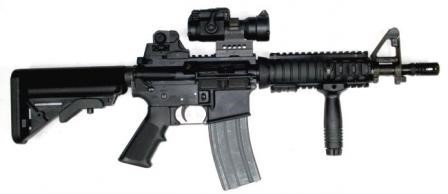US Department of Defence Spend on Guns in ‘War on Terror’ Revealed
Source: aoav.org.uk
In the 14 years following the terror attacks of 9/11, the US Department of Defence (DoD) issued contracts that, if fulfilled, would reach over $40 billion on guns and ammunition, according to research from London-based charity Action on Armed Violence (AOAV).
A team of researchers at AOAV spent almost a year analysing every contract published by the DoD between September 11, 2001 and September 10, 2015. These contracts are announced week-daily on the DOD contract website and then archived. They should show any DoD contract valued at $7 million or above.
Highlights from AOAV’s data
– US DoD published contracts worth over $40 billion on small arms, ammunition and attachments (if the upper limit listed on each contract was paid, the contracts would total $40,164,323,221). These included:
*$ 4.2 billion on small arms (guns through to 30mm – $4,287,730,438);
*$ 11.2 billion on attachments (e.g. sniper scopes, rifle grips, mounts, tripods – $11,227,280,979);
*$ 24.6 billion on munitions for small arms and upgrades to production facilities – ($24,649,311,805).
– Of these contracts the Federal Procurement Database System (FPDS) shows that $20 billionwas spent by 10/Sep/15 ($19,967,689,999):
* $3 billion on small arms (guns through to 30mm -$2,893,209,118 );
* $4 billion on attachments (sniper scopes, rifle grips, mounts, tripods, etc. – $3,926,832,188);
* $13 billion on munitions for small arms and upgrades to production facilities ($13,147,648,692);
* Almost $10 billion was spent on contracts to modernise and upgrade ammunition factories.
– Over 1.45 million guns were given by the US government to Iraq and Afghanistan (1,452,910), part of $2.16 billion worth of small arms related contracts.
* Only 3 per cent of these weapon purchases were detailed on the daily DoD contract publications.
* When pushed, the US DoD admitted over 700,000 small arms were sent from the US to Iraq and Afghanistan by them.
– 33% of all published DoD contracts contained mis-numbered contracts or discrepancies between the DoD contract statement and FPDS data (137 of 412).
– Ten companies won contracts that, combined, were worth 65 percent of the total DoD published contract values.
* The largest contract listed by the DoD was for the procurement of ammunition and for the operation and modernization of Lake City Army Ammunition Plant – this single contract was worth a potential $8,480,000,000.
Analysis of the data
AOAV found 412 contracts relating to the purchase of small arms, small arms ammunition and related gun attachments. These contracts revealed three things – they provided figures on the huge amount spent by the DoD on small arms; they revealed the errors, omissions and differences that exist between the DoD’s contract announcements and the US government’s own Federal Procurement Database (differences seen here); and they offered an insight into the lack of transparency surrounding small arms bought by the US government and given to Iraq andAfghanistan – many of which the US government has lost track of.
There were significant differences found between the DoD announcements and the Federal Procurement Database System (FPDS). A comparison of the two datasets showed that mis-numbered contracts, errors or discrepancies in listed contract payments, and other misalignments were found in 33 percent of all published contracts. Of these, 12 percent had a DoD contract number which did not align with the FPDS’s contract listings. 83 percent showed the DoD figure that was stated as having been paid did not match that listed by the FPDS. Details of these inconsistencies can be read here, and a case study of such discrepancies can be read here.
Total DoD contracts for small arms
AOAV’s overview of published DoD contracts from Sep 2001 to Sep 2015 for small arms revealed that:
– 129 small arms contracts were publicly listed;
– these totalled a potential $4,287,730,438 worth of contracts;
– the weapons mentioned included:
* $1,954,462,485 for assault-rifles (not including AKs) in 46 contracts (types of guns included in contracts [and the number of contracts issued] – (including M4 [31], M4A1 [14], M16A4 [13], M16 [7], M16A3 [3], IAR [3], FN SCAR [1]);
* $203,667,929 for AK-47s [the contracts included group orders of other multiple items (AK-47 [3]);
* $96,629,334 for sniper rifles (M110 [2], M24 [3], XM2010 [1], MK11 [1], MK13 [1]);
* $1,550,000,459 for machine guns (M2 [15], M249 [12], M240B [7], M2A1 [6], M240L [4] MK48 [4], MK46 [3], M240 [3], M60 [2], M60E4 [2], M2HB [1], Unspecified [4]);
* $496,078,034 for pistols/handguns (M9 [2], SW9VE [1], Beretta 92FS [1], Sig Sauer [1], Unspecified [2])
Total DoD contracts for attachments
– 100 attachment contracts were published by the DoD during the time frame;
– the DOD published contracts worth a possible total of $11,207,642,579 on weapon attachments – these included things such as sniper scopes, rifle grips, mounts and tripods.
Total DoD contracts for munitions
– 183 munitions contracts were published by the DoD during the time frame;
– these totalled $24,649,311,805 worth of contracts for small arm ammunition;
– this included $9,577,304,525 worth of contracts to modernise and upgrade ammunition factories.
Total DoD contracts awarded
– 412 contracts were announced (129 for small arms, 183 for munitions, 100 for attachments);
– 79 companies were recipients of these small arms related contracts;
– Ten companies won contracts that, combined, were worth 65 percent of the total DoD published contracts. Details on these can be read here. The top five recipient companies (including their subsidiaries) were:
* Alliant Techsystems – $21,977,118,613 (101 contracts);
* DRS Technologies Inc. – $3,251,224,478 (8 contracts);
* BAE Systems Inc. – $2,761,670,581 (8 contracts);
* Knight’s Armament Co. – $1,782,974,456 (15 contracts);
* General Dynamics – $1,626,048,701 (36 contracts).
Foreign military assistance
– $799,793,122 worth of contracts were published by the DoD as being for foreign military assistance;
– this included $363,252,158 on stated contracts for guns through to 30mm (of this, $203,667,929 worth of contracts were listed as for AK-47s).
Iraq and Afghanistan – the true figures
The foreign military assistance figures, though, should be treated as being under-estimates of the total spend. AOAV’s review showed that the DoD routinely fails to publish records of significant amounts of foreign military assistance and contracts. For instance, the DoD published contracts for small arms, attachments and munitions purchases for Iraq and Afghanistan that if fulfilled totalled just $277,795,299 ($97,330,069 for Iraq and $180,465,230 for Afghanistan).
AOAV conducted a detailed analysis of a wide array of other published US government sources. In the case of Iraq, this involved a review of DoD published contracts; FPDS listed contracts; Overseas Contingency Operation reports; an Inspector General Report; a 2013 CSIS Report; a 2007 GAO Report; a Section 655 Report; and a 2006 SIGIR Report. For Afghanistan, this involved a review of the DoD published contracts; the FPDS listed contracts; an Inspector General Report; a 2014 SIGAR report; US Government Accountability Office reports; an ASFF purchases document; and US Overseas Contingency Operation (OCO) request reports.
This wider analysis showed the DoD actually spent a possible total of $2,158,253,826 on small arms including ammunition and attachments to Iraq and Afghanistan – over $2 billion and almost eight times that publicly stated by the DoD ($1,176,671,415 for Iraq; $981,582,411 for Afghanistan).
This includes 1,452,910 small arms being sent to Iraq and Afghanistan (949,582 for Iraq; 503,328for Afghanistan). Of these:
* 692,439 were listed as assault rifles – not including AK47s (491,474 for Iraq, 200,965 for Afghanistan);
* 285,981 were listed as AK47s (95,981 for Afghanistan and 190,000 for Iraq);
* 266,272 were listed as pistols (176,983 for Iraq, 89,289 for Afghanistan);
* 111,844 were listed as machine guns (54,099 for Iraq, 57,745 for Afghanistan);
* 13,604 were listed as shotguns (346 for Iraq, 13,258 for Afghanistan); and
* 11,475 were listed as sniper rifles (2,248 for Iraq, 9,227 for Afghanistan).
* For Afghanistan there were also 36,575 unspecified rifles listed and 288 unspecified non-standard small arms listed; for Iraq there were 34,432 unspecified rifles listed.
The DoD published-contracts, however, only listed 19,602 of these weapons (18,390 to Iraq and 1,212 to Afghanistan) – just over 1 per cent of the 1,452,910 total.
In March 2016, AOAV offered the DoD the opportunity to provide their own data on the small arms sent to Iraq and Afghanistan. In August 2016, the DoD sent AOAV two charts that they believed accounted for the small arms sent to Iraq and Afghanistan between 2004 and June 2016 for Afghanistan, and 2005 and June 2016 for Iraq. The DoD figures showed that 719,474 small arms were sent from their funded programmes to Iraq (201,153) and Afghanistan (509,321). This only accounts for 48% of the total small arms supplied by the US government found in open source government reports.
Such shortfalls highlights the lack of accountability, transparency and joined up data that exists at the very heart of the US government’s weapon procurement and distribution systems. AOAV’s findings are backed up by previous reviews. For instance, a US Government Accountability Office report from 2007 found the US government had issued at least 185,000 AK47s procured for Iraq between 2004 and 2005 alone. Another 5,000 AK47s were recorded as being sent to Iraq in a US Overseas Contingency Operation (OCO) request report in 2015. And yet, the DoD only claims 22,249 rifles of 7.62mm calibre were sent to Iraq. As the DoD pointed out, their data does not include weapons that were provided by the Department of Defense to the security forces in Iraq and Afghanistan without using the Foreign Military Sales system.
A 2014 Special Inspector General for Afghanistan Reconstruction report also found, that in Afghanistan, 43% (or 203,888) of US funded small arms had duplicate or incomplete records.
Other articles
In addition, AOAV has published articles on the differences between the US Department of Defence and the Federal Procurement Database System contract listings; the data provided by the DoD; DoD contract numbering methodology; a short definition of small arms; and articles listing the weapon types found in the reports such as assault rifles (with a separate report on AK47s), machine guns, sniper rifles and pistols.
AOAV published datasets
The following datasets were also published as part of this review:
US DOD War on Terror Small Arms Expenditure Total Dataset
Specific dataset on US DoD published contracts for Iraq and Afghanistan
Iraq and Afghanistan spending report totals from US Overseas Contingnecy Operations
Centre for Strategic and International Studies Report on Iraq small arms sales
Details of FPDS contracts listed in a DoD Inspector General report-listed into small arms contracts in Afghanistan
FPDS listings for all DoD purchases of ‘guns through 30mm’
US purchases of small arms to Iraq and Afghanistan 2001 to 2015
US purchases of small arms to Afghanistan 2001 to 2015
AOAV response
Iain Overton, Action on Armed Violence’s Director of Investigations, said of the findings: ‘We conducted this review after a Freedom of Information request to the US Department of Defence, asking for details on AK-47 sales to Iraq and Afghanistan, was returned completely redacted.’
‘We did not anticipate, though, finding so much money having been spent by the Department of Defence on small arms, ammunition and attachments. We are not talking aircraft carriers here; $40 billion is a huge amount of issued contracts just for guns, attachments and ammo, even over 14 years of warfare.’
‘More importantly, our findings raise concerns about the DoD’s own transparency and accountability when it comes to issuing contracts. It highlights the fact that significant numbers of small arms, for instance, are sent to foreign governments but are never publicly recorded by the DoD publicly. We know by looking at other US government records, that at least 1,452,910 small arms have been sent to Iraq and Afghanistan in the last 14 years. The DoD contract database appears to list as little as 3% of these. We also know the US government has acknowledged they don’t know where many of these weapons now are.’
‘We hope our findings and database summaries will inform the US debate on seemingly unchecked and military expenditure and highlight concerns about the US government’s oversupply of arms to unstable states.’
+++++
Notes
– Action on Armed Violence (AOAV) is a London based charity. It has a central mission: to carry out research and advocacy in order to reduce the incidence and impact of global armed violence.
– AOAV’s definition of a small arms is any gun with a 30mm caliber or under. For more on this see here.
– The DoD contract archives provide a database where contracts over $7 million are announced. The contracts on the DoD provide information in relation to the award, such as; the date of the award, who the contract was awarded to, the size of the contract, the contract number, weapon types, ammunition calibre or type of attachment. For more information on the DoD contracts see here.
– The FPDS is a searchable database where contracts from as little as $3500 are listed. The FPDS lists the amount that has been spent, extra funds spent and refunded amounts. It lists who the funds were awarded to, the contracting agency and the date of the award, but rarely seems to give detail on the type of small arm purchased or if the weapon was procured for a foreign military. Sometimes small arms were listed under broad headings on the FPDS, such as ‘miscellaneous ammunition’ or ‘miscellaneous weaponry’, which without reference to the DoD data it would not be clear whether these contracts were for small arms or heavy weaponry.





